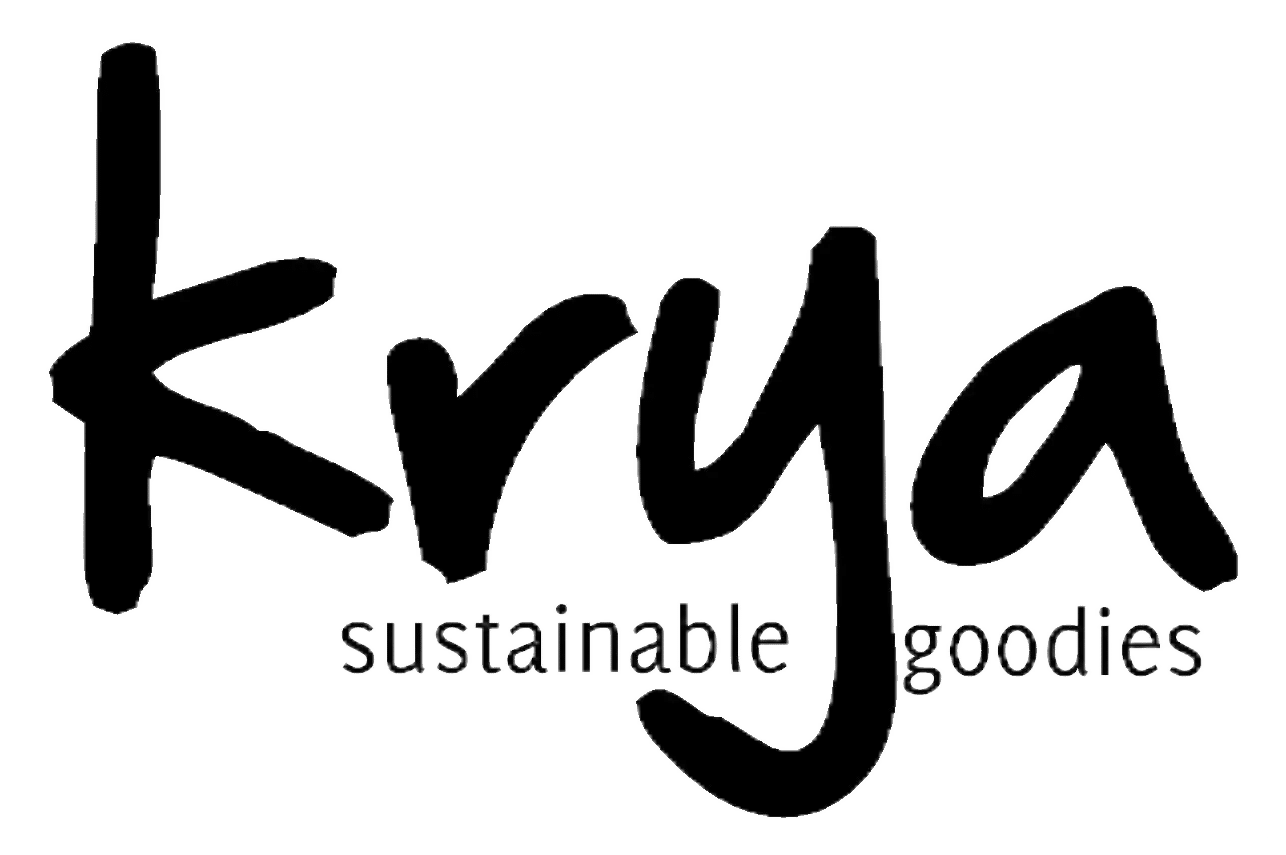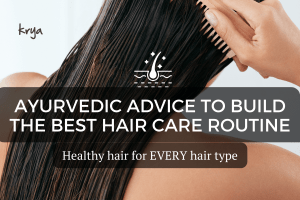This post was last updated on December 27, 2023 by Preethi Sukumaran
We are seeing a very high proportion of sudden and severe hairfall these days triggered by conditions like PCOS, PCOD and fertility treatments. Androgenic balding is rapidly increasing among women, and many of our consumers come to us for help after having gone through the entire round of Minoxidil, PRP, laser treatments, injections and medicines to regain hair growth.
Obviously the above treatments are synthetic, have limited success and come with many side effects, which are enough to prompt people into researching a good natural alternative.
The Krya Intense Hair system – designed for severe hair loss linked to illnesses
We launched the Krya Intense hair system , after we began receiving requests for hair growth products from people who were recovering after various illnesses like severe viral fever, covid, radiation therapy, and even long lingering illnesses like PCOS and PCOD. Our research into hair loss took us to how Ayurveda defines Indralupta (sudden, intense hair loss) and we co related it with the illnesses and medication patients would take in these illnesses. .
Our list of customers for the Intense hair oil slowly started expanding: we recommended this product to people who had undergone major surgeries, who had prolonged illnesses, and had been on medication for many years. We have also used the Krya Intense hair oil in severe cases of PCOD and fertility treatment related hair loss. To complement the Krya intense hair oil, we now have the Krya Intense hairwash and the Krya Intense hair mask, which form a part of the Krya Intense hair growth system.
Why is severe and sudden hair loss so difficult to treat? How is it different from normal hairfall?
In most cases, the reason for Hair problems is a simple imbalance. This does not need an advanced or specialised system and the body responds very quickly to the diet and lifestyle and product changes to give you good results.
In the case of severe illnesses or long term illnesses like PCOD, we see much slower results because the entire body has been left unsettled and stressed due to the illness itself and the medication used. In these cases, the body’s metabolism and nutritional intake is itself damaged. Usually, when nutrients are limited, teh body reserves its limited nutrition for extremely important organ systems.
So hair and skin are usually left un-nourished and can go bad very quickly. Therefore, a natural fallout of these illnesses is extreme and severe hair loss, where you lose upto half your hair’s volume and growth is slow.
Can we guarantee new hair growth?
We are often asked if we can offer guarantees for hair growth from these consumers. We empathise with the questions: after all they have often spent huge amounts of money and have been disappointed by treatments which have preyed on their natural insecurity and desire for normal hair growth.
However, as we often say, the success or the failure of natural herbs and natural treatments differs from person to person. Many factors come into play which include your body’s state of health, your state of mind (if you are depressed or stressed, it is much harder for any treatment to have an impact), the access you have to good quality food, the stress levels in your life and your ability to do something about it, and your willingness to make all the changes suggested to improve your health. Obviously over and above all of this, we have to factor in your genes, and your body’s current state of health and its willingness to make the change.
However, as we often say, all the recommendations we give for improving hair health are all sensible suggestions from Ayurveda that restore your body back to a state of health – so the suggestions are a good place to start anyway for good health and well being.
What we can say is this: following the suggestions given below are certainly give you and your hair an extremely good chance to regain health. So let us see these recommendations below:
General regimen and diet to be followed in PCOS & PCOD:
- Wake up around 5:30 am
- Do a round of light exercise (walking, yoga, etc) that works up sweat but does not leave you feeling tired or exhausted. This is critical to melt excess fat deposits in the body which is preventing structured hair growth.
- Avoid electronic stimulation (smartphone, facebook, checking email etc ) until after breakfast
- Breakfast at 8 am – please eat freshly cooked traditional Indian foods like upma, paratha, poha, pongal, cheela – fermented foods like idly / dosa/uthapam to be restricted to once a week only. No tea or coffee with this meal. Avoid the following: bread, maida based foods, peanuts, sesame, peanut butter, sesame butter, red and green chilly, tamarind. Add ½ teaspoon of melted ghee to your breakfast
- No snacking between breakfast and lunch unless you are really hungry. If hungry you can eat any fruit in season – chew slowly. Do not drink juices, smoothies / milkshakes / cola
- Lunch to be had between 12:30 – 1 – this can be the heaviest meal of the day. Eat until you feel full. Eat slowly, chew well. Add 1 teaspoon melted ghee to your food. Avoid curd completely. Also avoid any food that is very spicy, or sour or salty. Eat preferably freshly cooked home food only. Avoid desserts. Eat any food that is traditional to your family and is enjoyed by you.
- If you plan to eat difficult to digest food, lunch is the best meal to tackle this (if you must) – difficult to digest food is non-vegetarian food, pizza, oily food, sweets, a buffet lunch, or any manner of hotel food.
- Tea time – Eat only if hungry. You can eat a seasonal fruit or a glass of milk – milk to be had plain , warm and unsweetened. No fried snacks, no tea, coffee, cola, juice, milkshakes, smoothies, cold coffee, etc
- Dinner – to be eaten between 7:30 – 8 pm – lightest meal often day. Same as lunch, with the same restrictions. Add ½ teaspoon melted ghee to your meal.
- Ensure you have a good rotation of vegetables and eat a different vegetable everyday –local native vegetables in season are great for you like parwal, dhoodhi (bottle gourd), karela (bitter gourd), ash gourd, etc. Most of us tend to over-eat non native vegetables like potatoes and capsicum. Our body tends to absorb nutrients given by local vegetables that are in season much better.
- Avoid electronic stimulation (smartphone, facebook, checking email etc ) after dinner
- Sleep 2.5 hours after dinner – by this time your food should be well digested. 30 minutes before sleeping, drink one glass of hot water. This helps flush out toxins from the body.
Notes on diet and eating regimen for PCOS & PCOD:
Regulation of meals and giving your body predictability about when it will get food is crucial to restore health back to the body. These simple changes like eating at the right time, showing your food well, and eating freshly cooked food can go a long way in reducing excess weight, improving nutrient assimilation and enhancing well being.
Controlling the time that you eat balances both pitta dosha and vata dosha and controls excess kapha dosha – a huge change from such a simple act!
Controlling the amount of electronic stimulation your brain receives controls vata dosha – vata dosha is responsible for skin smoothness, complexion and energy – again such a good benefit from such a simple act
Foods to avoid / reduce in PCOS & PCOD:
- Sesame seeds, sesame oil, peanuts, peanut oil, peanut butter, peanut candy / brittle
- Spicy foods and herbs: red and green chilly, capsicum, mustard oil, onion, garlic
- Sour foods – tamarind, tomato, lemon, kokum, amchur, raw mangoes, curd, buttermilk, vinegar, cheese, paneer
- Salty foods – pickles, chips, crackers, preserved food, ajinomoto, papad, salty dried vegetables (vathal), canned food, processed tomato paste, tomato ketchup, processed biscuits and cookies, processed commercial bread, ready to eat foods
- Wind increasing foods and vegetables and fruits: avoid a high amount of raw foods, raw salads, fried foods, crisp foods like biscuits, chips, fries, etc. Reduce your dependence on vegetables like cabbage, peas, potatoes and other wind increasing foods.
- Sticky foods that can increase mucous accumulation: ice cream, milk shake, yoghurt, paneer, milk sweets, maida based cakes, biscuits and cookies, ready to eat noodles like Maggi
- Milk to be specially boiled in Ayurvedic way (described below) to avoid accumulating stickiness
- Sweet foods – cakes, pastries, milk sweets, cold sweets (very occasionally a very small portion of a warm home made sweet that you have made like kheer / payasam / halwa is ok), out of season fruits . If eating a mango, choose an organic, naturally ripened sweet mango – eat when hungry and do not eat anything else to ensure the mango is well assimilated and digested
- Follow the traditional “Mango soak “ technique before eating a ripe mango – soak the mango (with skin) in a bowl of clean water for 30 – 45 minutes before eating.
- Preferentially eat split Mung dal over other lentils – avoid lentils like Rajma, channa, vatana, lobia etc that are difficult to digest. Reduce Tuvar dal and masoor dal that tend to aggravate pitta dosha.
- Eat only when hungry. Eat slowly savouring each bite. Stop when you are full.
- Drink water whenever thirsty
- Drink water at room temperature or water that is warm
- Do not add additives to water like lemon, mint, etc which can upset one of the 3 doshas
- Your body’s need for water varies according to the temperature, what you have eaten and the kind of work you are doing on any given day. Do not force more water into your system based on a mistaken calculation
- Keep listening to your body and drink water as needed
- Water cannot be substituted with fruit juices, protein shakes , smoothies, flavoured water, vitamin water or anything else.
Notes on foods to avoid in PCOS & PCOD:
The texts have clearly classified foods , vegetables and herbs as per their properties and what dosha they aggravate if eaten in excess. For severe balding, male pattern hair loss and hair loss driven by conditions like PCOD, the texts say that 2 or 3 doshas can be out of balance, usually pitta and kapha dosha. Hence, we follow a meal plan that is tridoshic and avoid foods that aggravate one or 2 doshas.
Abhyanga Practice in PCOS & PCOD
Abhyanga practice is extremely beneficial in PCOS & PCOD. As regular abhyanga helps bring Pitta and Vata dosha to balance – this helps regulate the hormonal imbalance in the body gradually bringing COS under control.
- Full Body Abhyanga (self oil massage) twice a week in the morning using the Krya Classic women’s abhyanga system. This helps reduce dosha excesses and has been very good in aiding hair growth in cases of extreme loss.
- Abhyanga should be done within one hour of sunrise before the heat sets in for best effects
- Abhyanga must be done VERY briskly and should feel like exercise leading to warmth in the body and sometimes mild sweating
- Have a bath within 10 minutes of Abhyanga – do not soak for too long
- USe warm – hot water for bath (below the neck)
- Mix Krya Mangalya Lepa into the Krya Classic Women’s Ubtan and use this for your bath
- Use this product mix twice to have a bath – this ensures that the oil is completely removed from the skin surface. In PCOS, oil should not be left to remain on skin
- Please use a Krya face wash for your facial skin.
- Mini Abhyanga – suggested 2 times a week
- Pada Abhyanga – suggested 4-5 times a week at night efore sleeping. This helps further balance pitta and vata from the head region
Hair products to use in PCOS related hairfall & Abhyanga products to use:
- Abhyanga (self oil massage face and body) twice a week in the morning using the Krya Classic women’s abhyanga system. This helps reduce dosha excesses and has been very good in aiding hair growth in cases of extreme loss.
- Hair oiling 3 times a week in the evening around 7 pm OR 1 hour before sleeping AND 1.5 hours after dinner .
- We usually advice oiling with a combination of the Krya Classic Plus hair oil (to reduce excess pitta) and the Krya Intense hair oil (to balance excess kapha).
- If the hair loss is very extreme, use more of the Krya intense hair oil.
- Evening oiling is done in small quantity directly on the scalp
- Oil the scalp gently and avoid tugging or pulling at the hair
- Post oiling use a wide toothed comb to de-tangle the hair and plait it to keep it from getting further damaged
- Restrict hair wash to once a week only with the Krya Intense hairwash if the hair is extremely weak. If it is a bit stronger, please use the Krya conditioning hair wash.
- On hair wash day, oil your hair and scalp generously with the Krya Intense hair oil and then apply the Krya Intense hairmask.
- It is advisable to do one of the 2 abhyangas suggested on this day as well.
- Hair that is undergoing severe hairfall is very weak at the roots – this is why we advise restricting washing it to avoid further damage. Use water that is as cool as possible to wash your hair.
- To wash your body (below the neck) use only warm water – cold water aggravates vata and dryness further. To wash your face use cool water
- If your hair feels very sticky and you have been sweating profusely, you can rinse your hair in plain water without any product.
- Do not use a blow dryer on the hair. Allow it to air dry. Do not use a towel and rub or tug the hair hard.
- Do not use clips, bands and grips on weak hair. Avoid brushing. Cover hair with a scarf when going outdoors.
Notes on Hair products in PCOS & regimen changes:
For intense hair oil, we prescribe a more intensive frequency of hair oiling with a specially prepared oil that is designed to tackle Indralupta (sudden and intensive hairfall). For this kind of hairfall, the oil needs to stay longer on the hair and help reduce heat and remove the sticky scalp deposits that prevent new hair growth. This is why evening oiling is advised so that oil stays on longer.
Hair that is intensely falling is very weak at the roots. Ensure you avoid stressing it in any way.
How do I know the PCOS regimen is working? Some observable changes:
- Your sleep quality is much better
- Your bowel movements are quick, easy and smooth
- Your “business” is done very quickly
- There is no pain, no straining, and no difficulty
- There is less or reduced wind
- The bowel movement is firm, well formed and is in 1 / 2 masses – it is not loose and liquid, pellet –like or hard
- The bowel movement does not have an excessively foul or putrid smell
- Your appetite is strong and appears at the right times
- You eat your food with a good appetite
- The food stimulates your salivary glands and you find the food tasty and satisfying
- You do not have any intensive cravings for salty , sour or sweet food
- You remain calm, balanced and steady between meals. You do not have mood swings, food cravings or random hunger
- You do not have a “crash” 30 – 45 minutes after eating and become sleepy or moody. You continue to stay steady and upbeat through the day, even after meals.
- Your energy levels are good and steady
- You need less stimulation during the day in the form of tea and coffee
- You can focus more and get things ticked on your task list
- You “lose it” less frequently and do not give in to rage or anger management issues
- You are firm, yet patient without snapping
- You are cheerful and good humour and do not get low or depressed easily
- You are able to be with yourself without depending on peppy music or cricket or sitcoms to put you in a cheerful mood
- Your body is stronger and feels lighter
- You do not get aches and pains in your bone and joint system
- You are able to move fast and feel full of energy
- Your body has less aches and pains
- You do not get as many migraines, headaches, tension headaches, gastric irritation, etc as you used to
- Physical movement is easier, and is done without strain or a feeling of heaviness
- Your hair starts to improve in stages (stages given below):
- It needs less washing and does not secrete excess sebum or look very oily between washes
- Hair breakage reduces as cuticular damage reduces.
- Hair dryness goes down and there is a reduction in number of split ends and depth of split ends
- Hair’s elasticity improves – so it can be tugged more and more without it breaking and falling
- Hairs porosity improves as holes in the cuticular structure are improved. So it breaks and falls less when exposed to water
- Hair texture feels softer and smoother
- Hair has a healthy sheen as sebum secretion is balanced and cuticular stricture is healthy and repaired
- Hair colour improves and hair starts to look its natural colour and does not appear dull, brownish or reddish.
- You can see fresh new hair growth – the new hair is healthy and has a good colour , normal thickness and texture
To conclude: 27 ideas from Ayurveda for PCOS hair thinning
We have had good success in cases of extreme hairfall, and have seen encouraging results when consumers have followed a large proportion of our suggestions and when changes are made across diet, regimen and lifestyle. Obviously the suggestions given below are for a wide audience, and need to be customised for special hairfall cases like hairfall duet to chemotherapy, hairfall due to vata aggravation, etc. If you too would like our help, please DM us on WhatsApp or Email us.





Can you please give us a sample 3 day diet ? With so many foods being banned, it’s confusing to understand which ones are good for us.
Hi I have severe hair fall and dry and fizzy hair.what type of hair oil I should use for proper regrowth?kindly help.
Tanvi: it would depend upon the reason behind hair fall. It would help if you send us an email with your hair history – ([email protected])
Preethi,
Which oil does one cook with is sesame, peanut and mustard isn’t ok.
I avoid the refined sunflower oils etc.
Coconut, and cold pressed sunflower or ghee is ok. Small amounts of the other oils you have mentioned are also ok as long as there is no acute dosha imbalance.
Hi,
I am 27 year old female with thinning hair. Although i do not have excessive hair fall but till date i frequently have irregular periods with mild pcos detected 4 years back.
Every time i oil, i loose a lot of hair and hair volume has decreased over the years specially over the crown area.I have oily scalp with slightly dry ends and they need washing 3 times/week.
I don’t know if oiling is helping or not.
What Krya products to use along with the diet mentioned above?
Hi Kajol,
It might be helpful to try a combination of our Krya Classic Plus oil along with Intense hair oil. Can you write to us with pictures of your scalp + hair length? It would be helpful to make a more accurate recommendation: please write to [email protected]